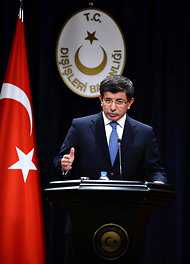By DAN BILEFSKY and ANTHONY SHADID
ISTANBUL — Turkey took steps on Wednesday to freeze the Syrian government’s financial assets, impose a travel ban on senior Syrian officials and cut off transactions with the country’s central bank, sharply escalating international pressure on Damascus in response to its continuing violence against civilians.

Dilek Mermer/Anadolu Agency, via European Pressphoto Agency
Turkey’s foreign minister, Ahmet Davutoglu, announced strict new measures against Syria in Ankara, Turkey, on Wednesday.
The latest measures, Turkish officials said, were enacted in concert with the Arab League, which imposed broad trade sanctions on Sunday, and are part of a developing international effort to strangle Syria’s economy and severely diminish the power of its government.
Also on Wednesday, the Arab League unveiled a list of 17 senior Syrian officials who could face a ban on travel to other Arab countries, including the ministers of defense and interior. Also on the list are Rami Makhlouf, a millionaire cousin of President Bashar al-Assad who has controlled the mobile phone network; Mr. Assad’s younger brother Maher, who heads the elite Fourth Division and the Republican Guard; and members of the state security service, including Maj. Gen. Assef Shawkat, the deputy chief of staff for security affairs, who is married to the president’s sister.
European, American and Turkish officials all said they believed Syria’s economic troubles could prove the undoing of Mr. Assad, who to date has managed to maintain the allegiance of Syria’s business elite.
Reiterating his calls for Mr. Assad to relinquish power and to stop his brutal assault on his own people, Turkey’s foreign minister, Ahmet Davutoglu, said in Ankara that the measures would include an extensive ban on military sales to Damascus and a blockade of weapons deliveries from third countries at Turkey’s land and sea borders with Syria. He said Turkey would also stop new transactions with the Commercial Bank of Syria and halt all credit to the Syrian government.
“Every bullet fired, every bombed mosque has taken away the legitimacy of the Syrian leadership and has widened the gap between us,” Mr. Davutoglu said. “Syria has wasted the last chance that it was given.”
He said the list of sanctions was a “first stage” in the measures against Damascus. The government also stressed that Wednesday’s sanctions would not include vital supplies like water and electricity that could harm the Syrian people.
Syria is heavily reliant on Turkey for trade, which more than tripled between the two countries to $2.5 billion in 2009, from $795 million in 2006. Before the recent souring of relations, it was forecast to reach $5 billion by 2013.
The European Union and the United States were the first to impose penalties, and European sanctions, in particular, harmed Syria’s oil industry, which once contributed as much as a third of the government’s revenue. Though Europe is Syria’s biggest overall trading partner, Turkey and Arab states make up four of its next five biggest, and the Syrian leadership, along with those tied to it, has large investments in the Persian Gulf.
The Obama administration commended Turkey for its latest steps, and noted that Prime Minister Recep Tayyip Erdogan had coordinated closely with President Obama. “The leadership shown by Turkey in response to the brutality and violation of the fundamental rights of the Syrian people will isolate the Assad regime and send a strong message to Assad and his circle that their actions are unacceptable and will not be tolerated,” said a statement issued by a White House spokesman, Tommy Vietor.
An Obama administration official in Washington estimated that the Syrian government had lost more than 40 percent of its revenue, with the oil industry reeling and tourism devastated. The official said that the Assad government was having more trouble than ever supporting the Syrian pound, which residents say has fallen 12 percent in the black market from its official rate and now trades at 56 pounds to the dollar.
The Arab and Turkish sanctions also carry great symbolic weight. Just a year ago, neighboring Turkey was emerging as one of Syria’s closest allies, and Damascus has long managed to play on inter-Arab rivalries to maintain a profile that traditionally outstripped its resources or relative strength. Moves by both the league and Turkey have left it as isolated as at any time since Mr. Assad’s father, Hafez, seized power four decades ago.
In Syria, some people said they feared the sanctions could embolden government supporters and focus criticism on external forces. “The sanctions will make the regime supporters even more supportive,” said Joelle, 25, a graphic designer from Damascus. “That’s the notion I’m getting from people around me. They are blaming Arab nations for what’s happening to them, and reminiscing about the old days. They feel that this is an insult to Syria’s sovereignty.”
The intensification of pressure by Turkey against Syria is part of a radical about-face in relations between the two countries, as Turkey seeks to assert its leadership in the Muslim world. Only a year ago Mr. Erdogan and Mr. Assad took vacations together and the countries held joint cabinet sessions.
Next Page »
Dan Bilefsky reported from Istanbul, and Anthony Shadid from Beirut, Lebanon. Reporting was contributed by Sebnem Arsu from Istanbul; Neil MacFarquhar from Damascus, Syria; Nada Bakri from Beirut; and Brian Knowlton from Washington.

Leave a Reply